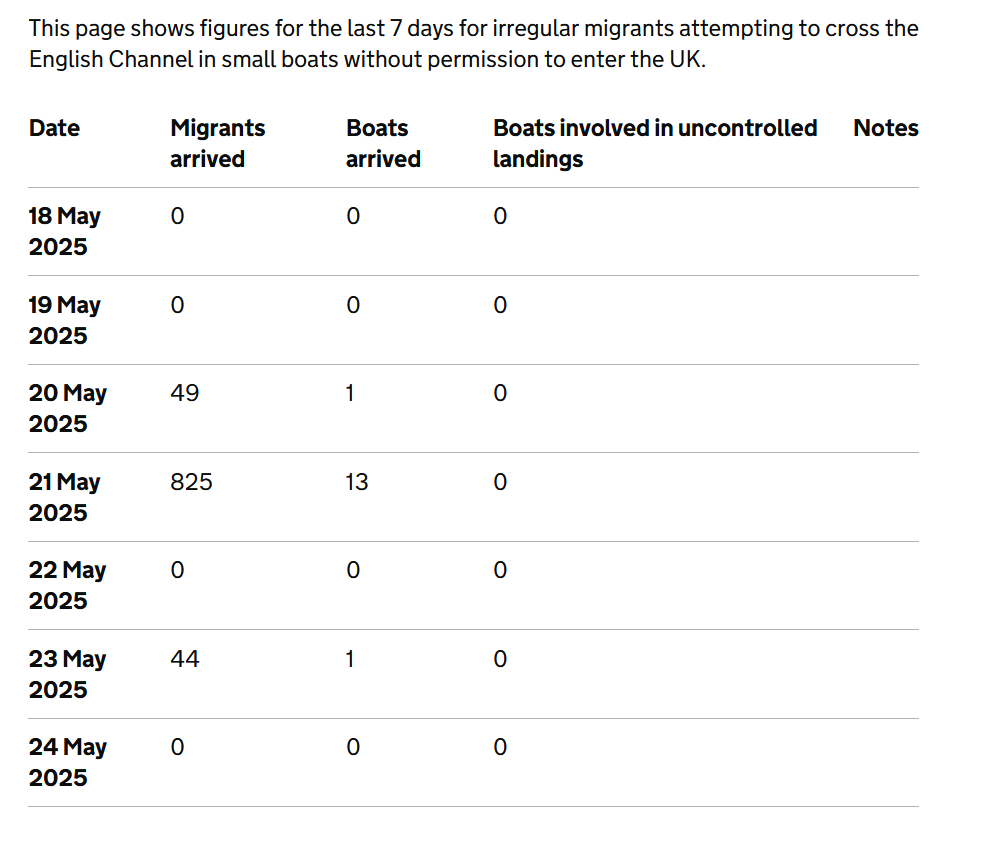News Round-Up: Meta Grabs Your Data for AI, New Zealand Abandons Net Zero, and Germany’s Exploding Migrant Population
Every week, the editorial team of Freedom Research compiles a round-up of news that caught our eye, or what felt like under-reported aspects of news deserving more attention.
Over the past week, the following topics attracted our attention:
Meta’s AI ambition: your personal chats and data up for grabs.
New Zealand abandons Net Zero push.
1 in 4 in Germany has now a migrant background, official data reveals.
French intelligence ordered Telegram to censor Romanian politician they deemed unsuitable.
UK: migrant crossing will hit a record high this year.
Meta’s AI ambition: your personal chats and data up for grabs
Meta has announced it will use personal data from Instagram and Facebook users in the EU to train its new AI systems from May 27 onwards, NOYB (none of your business) – European Center for Digital Rights reports. Instead of asking consumers for opt-in consent, Meta relies on an alleged 'legitimate interest' to suck up all user data.
The new EU Collective Redress Directive allows qualified entities such as Noyb to issue EU-wide injunctions. As the first step, Noyb has now sent a formal settlement proposal in the form of a so-called Cease and Desist letter to Meta. Other consumer groups also need to take action. If injunctions are filed and won, Meta may also be liable for damages to consumers, which could be brought up in a separate EU class action, considering the costs of damages could reach billions. In summary, Meta may face massive legal risks – just because it relies on an "opt-out" instead of an "opt-in" system for AI training.
Noyb is convinced that given Meta's huge number of users, the consent of just 10% of users would be enough for AI to learn EU languages and fulfil other pursuits. However, it feels completely absurd to claim that the personal data of all Meta users who have used Facebook or Instagram in the last 20 years is necessary for this. Meta has promised not to use messages and data from users under the age of 18. However, those defending people's privacy consider the whole system erraneous and believe it can turn the EU's General Data Protection Regulation (GDPR) consent model on its head.
Noyb outlines 11 legal arguments challenging Meta's interpretation of the GDPR. The main argument is that users could not reasonably have expected that their past activity on social media, in some cases dating back to 2004, will be used to train AI. The organization also refers to previous rulings by the Court of Justice of the European Union (CJEU), such as Bundeskartellamt vs. Meta and Google Spain, which emphasized the limits of commercial interests over data protection rights.
Noyb argues that once user data has been added to open source AI models such as Meta's Llama, it is impossible to guarantee GDPR rights (the right to delete one's data, correct inaccuracies, or access data stored in AI). In Noyb's view, this renders all legitimate interest claims legally unfounded. The organization also criticizes Meta's behavior in relation to the right to object under Article 21 of the GDPR, arguing that Meta has limited the right to object to a narrow time frame and has not taken into account those users who do not actively use their accounts or who are indirectly connected through third parties.
Noyb believes that the solution for Meta is simple: to ask users for consent (not objection). But Meta is trying to give the impression that if AI training would comply with the EU's General Data Protection Regulation, it would not be possible to train AI in the EU at all (see their absurd press release on Germany).
If Meta refuses, Noyb could seek an EU-wide court order to force the company to stop training AI. A court ruling could also require that AI trained with improperly collected data be deleted altogether. However, since AI is not easy to reverse, especially in the case of open source code, the legal and financial consequences for Meta could be enormous. Noyb estimates that the damage could amount to €200 billion if all 400 million EU users were to claim €500 in damages.
The European Court of Justice has already ruled that Meta does not have a legitimate interest in using the clause to target users with advertising. It is therefore questionable whether such an interest could exist in the case of artificial intelligence training. In Noyb's view, Meta seems to be saying that its interest in making money is more important than the rights of users. In any case, Noyb recommends that users review Meta's notices as soon as possible and object if they do not want their data to be used to train AI.
New Zealand abandons Net Zero push
New Zealand has abandoned its pursuit of Net Zero by revoking a ban on drilling for oil and gas, The Telegraph reports. The country’s current government plans to invest NZ$200m (€104 million) in new offshore gas fields to attract international oil and gas companies to the country.
The reversal marks an end to a policy announced by the former prime minister of the country, Jacinda Ardern, in 2018. She claimed at the time that “the world has moved on from fossil fuels”.

However, Nicola Willis, New Zealand’s current finance minister, has consigned Ardern’s policy to history by announcing plans to expand offshore gas fields.
It comes after New Zealand’s planned shift to renewables backfired, generating higher prices and raising the risk of blackouts.
1 in 4 in Germany has now a migrant background, official data reveals
Germany’s migrant population is surging, with new data from the Federal Statistical Office (Destatis) revealing that more than one in four people now living in the country has a migrant background, Remix News reports.
In 2024, the number of residents with a migrant background rose by 4 per cent, or 873,000 people, compared to the previous year, reaching a record total of 21.2 million. This represents 25.6 percent of the total population, up from 24.7 percent in 2023.
The term “migrant background” includes both those who have immigrated themselves (first-generation migrants) and those born in Germany to two immigrant parents (second generation). Nearly 16.1 million people — 19.4 per cent of the population — are immigrants themselves, while an additional 5.2 million, or 6.3 percent, were born in Germany to two foreign-born parents.
In contrast, the native-born population devoid of any history of immigration fell by 1 percent (734,000 people) to 57.4 million, now comprising 69.3 percent of the country.
French intelligence ordered Telegram to censor Romanian politician they deemed unsuitable
Telegram founder Pavel Durov published posts last week on social media platform X criticizing France for trying to silence the right-wing voices of Romania on Telegram, ahead of the country's presidential election last Sunday. Durov claimed that French intelligence service tried to force him to do so.
Durov wrote on X that he did not agree to block the accounts indicated by the French authorities. According to him, Telegram has never restricted the voices of any protesters, whether in Russia, Belarus or Iran. He has no intention of doing so in Europe either. Durov wrote that democracy cannot be protected by destroying democracy, and that interference in elections cannot be fought by interfering in elections. Durov said: “You can’t “defend democracy” by destroying democracy. You can’t “fight election interference” by interfering with elections. You either have freedom of speech and fair elections — or you don’t. And the Romanian people deserve both.”

In another post, Durov said that the French authorities had confirmed meetings with him, but claimed that the sole reasons were terrorism and the fight against child pornography. However, according to Durov, the real reason was geopolitics: Romania, Moldova, Ukraine.
The French authorities have strongly denied the accusations and called the allegations that they tried to interfere in the Romanian elections completely unfounded. The Foreign Ministry quickly labeled such posts as false and categorically rejected them. The state has told the media that it met with the owner of Telegram, but only to “remind him of his company's responsibilities in preventing terrorism and child pornography.”
Politicians from Europe's centrist parties were quite concerned about the Romanian elections, fearing a victory for the right-wing candidate. However, the presidential election was won by Bucharest Mayor Nicusor Dan, a centrist described as pro-European, who surprisingly defeated right-wing candidate George Simion, who had promised to steer the country in a direction inspired by US President Donald Trump's policies.
UK: migrant crossing will hit a record high this year
Illegal Channel crossings by migrants are on a course to hit a record total this year, according to new modelling by Dr. Richard Wood, The Telegraph reports.
Based on current weather trends, Wood has forecast that arrivals will hit nearly 46,000 this year, which will be on par with 2022’s record and 20 per cent up from last year’s total. A data scientist specialising in forecasts for real-world scenarios, Dr Wood has drawn up modelling based on key factors that influence the number of crossings, including the weather and sea conditions, government policies, and illegal migration into the EU over the past five years.

His modelling, based on data from 2020 to 2024, has already accurately forecast the record number of crossings so far this year – he predicted 12,074 by May 15. The Home Office figure for the same day was 12,699, 31 per cent up from last year. If the weather stays favourable, his modelling says the number will hit 45,651 this year, on par with 2022’s record of 45,755. “If such a trend continues, we would expect between 45,000 and 50,000 crossings this year,” said Dr Wood, who has a PhD in maths and has published 50 peer-reviewed academic papers, mostly on the statistical modelling of real-world scenarios.
Dr. Wood believes his statistical modelling could enable policymakers to understand and plan for the “complex interactions” between the many factors that drive the number of crossings.
If favourable weather continues this year and there is high or above average illegal immigration into the EU, his modelling projects the total could rise up to 54,903. If these factors were then combined with a low rejection rate for asylum seekers in the UK, the total would increase to 65,337, 44 per cent higher than in 2022.
However, his modelling showed high asylum rejection rates could act as a deterrent. Taking a baseline of 23,954 migrant crossings, that number could be reduced by 14 per cent if asylum refusals rose to their past high of 60 per cent. But they could increase by 19 per cent if refusals fell to a past low of 5 per cent.



